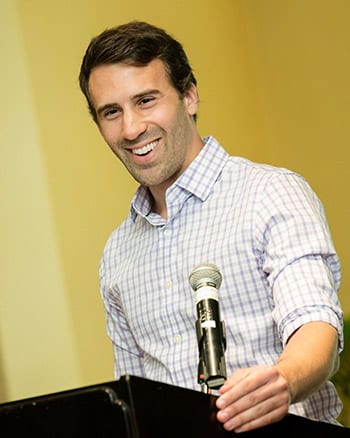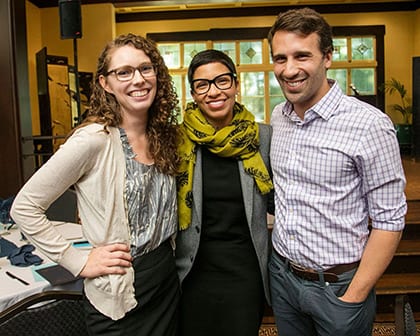By Andrew Cohen

While debating whether to go to law school, Alex Kaplan ’16 figured it could make him a better policy advocate. Still, he worried that the training might be too academic.
“But Berkeley Law was different in how it held up its clinics as an invaluable part of its public mission,” Kaplan said. “And I’m only half joking when I say that what put me over the line was when I read Jeff Selbin’s clinical professor biography and saw his picture, where he’s smiling in a leather jacket. I thought, ‘Alright, it’ll be okay.’ It turned out to be the greatest opportunity of my life.”
On April 25, Kaplan received the school’s annual Sax Prize for Clinical Advocacy during a ceremony at the Bancroft Hotel. Named for the late Brian Sax ’69, a respected San Francisco litigator and Berkeley Law lecturer, the prize honors a graduating legal clinic student who displays excellence in advocacy and professional judgment. Kaplan was chosen from a group of nominees who worked at the school’s various legal clinics.
“As my fellow students here know, when you engage in these law clinics, it envelops you,” he said during his acceptance speech. “It feels right. It feels like this is what law school should be about.”
The Policy Advocacy Clinic (PAC) and East Bay Community Law Center (EBCLC) reaped the fruits of Kaplan’s tireless labor. He spent four semesters and a summer at PAC working to end California’s practice of charging fees to families with youth in the juvenile justice system—which exacerbates poverty and disproportionately affects people of color.
To uncover fee systems across the state, Kaplan surveyed its 58 chief probation officers and later submitted more than 30 public records act requests. After compiling and analyzing the data, he helped transform it into a compelling narrative that the clinic presented to the Alameda County Board of Supervisors. Earlier this month, the board imposed a moratorium on imposing and collecting juvenile fees in the county.
Tireless and team-oriented
PAC teaching fellow Stephanie Campos-Bui ’14 said “Alex has led the effort to repeal juvenile fees statewide. He single-handedly drafted Senate Bill 941 and gathered over 25 organizations in support of it.” The bill would repeal county authority to assess and collect juvenile system fees statewide. Campos-Bui also called Kaplan “warm-hearted, selfless … and a consummate team player. His first question after learning of this award was whether we could recommend a good place to donate the money and help families caught in the juvenile system.”
At EBCLC, Kaplan’s research fueled a new report that reveals stark racial and socioeconomic disparities in California driver’s license suspensions—and arrests—related to unpaid traffic fines and fees. He also helped craft Senate Bill 881, which would end license suspensions as a debt collection tool.
Kaplan described meeting a young client who years ago had received a red-light ticket. He could not could afford to pay the $400 fine, or the subsequent $300 civil assessment issued by the state for failure to pay. His driver’s license was suspended for non-payment—but he had to keep driving to work to pay off the debt.
“His risk of being pulled over was so much higher than mine because of the color of his skin and the condition of his car,” Kaplan said. “He got pulled over for the 10th time in his life—that’s never happened to me—was fined another $400 and arrested for driving on a suspended license, and then fined another $300 for being too poor to pay.”
Infuriated, Kaplan began working with a coalition of lawyers and activists to draft legislation to end this policy. After countless hours securing and distilling statewide data, he enlisted support for the bill and presented it—with his young client’s testimony—in Sacramento. Now, Kaplan sees the bill “getting close to victory” in the state legislature.
“Alex took on a level of responsibility that none of us had really seen from a student before,” said Mari Castaldi, the program coordinator of EBCLC’s Neighborhood Justice Clinic.
Honorable Mention
Caitlin York’16 received the Sax Prize honorable mention award for her stellar work with the Death Penalty Clinic this year and EBCLC last year.

EBCLC Youth Defender Clinic Director Kate Weisburd called her “brilliant, tenacious, brave, and deeply committed to justice.” She described how York deftly represented a severely disabled 9th grader who got expelled from an Oakland high school, and a homeless teenager charged with trespass, in juvenile court. “Caitlyn was always patient, client-focused, and listened—really listened—to her clients,” Weisburd said.
At the Death Penalty Clinic, York worked on a student team that helped represent a man on death row. She made five trips to Arizona to visit the client, attend court dates, and interview witnesses, and provided pivotal help investigating and drafting legal arguments.
“Caitlin conducted herself with textbook professionalism, put witnesses at ease, and came away from each conversation with new evidence in support of our legal claims,” said clinic teaching fellow Kathryn Miller ’07. “Simply put, Caitlin York is a rock star without the rock star attitude.”
Earlier in the ceremony, Berkeley Law’s clinical directors—Elisabeth Semel (Death Penalty Clinic); Tirien Steinbach ’99 (EBCLC); Claudia Polsky ’96 (Environmental Law Clinic); Laurel Fletcher (International Human Rights Law Clinic); Selbin (PAC), and Catherine Crump (Samuelson Law, Technology & Public Policy Clinic)—described their students’ wide-ranging achievements over the past year.